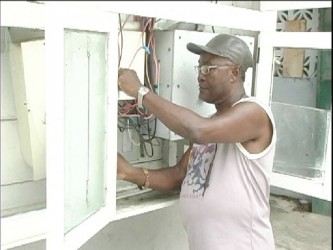Alfred Petty’s Unique Electrical & Consultancy Services, situated in Kent Street, New Amsterdam is an example of the many tough and resilient business enterprises that have waged a ceaseless struggle to ascend to the top of the proverbial pile without ever once contemplating that it might not get there.
An electrician for more than 40 years, Petty has ‘been around’, so to speak. He was an apprentice to a Mr Laurie Cameron shortly after leaving school, before moving to the Guyana Youth Corps. A stint with the Guyana Defence Force (GDF) was followed by permanent employment with the Berbice Mining Enterprise (Bermine). Afterwards he worked as an electrician with more contractors than he can count across the various regions of Guyana.

It was in 1985 that Petty decided that his skills as an electrician needed to be complemented by certification. He acquired the electrical wiring and installation licence issued by the Government of Guyana and that enabled him to pursue electrical installations as an independent operator and to provide services as a contractor. In effect he had positioned himself to start a business of his own.
Certification, he said, also engendered a heightened sense of professionalism. He prides himself on thoroughness and a commitment to delivering satisfactory service.
Transformation from employee to business owner has been an eye opener for Petty. While he believes the current countrywide housing drive has opened up opportunities for electricians, he is concerned that the skills’ levels in the profession may not always match requirements. He blames this deficiency on a lack of properly supervised training and what is often a preoccupation with “paper qualifications”. Petty said a great many applicants for jobs with his establishment tend to match salary expectations to paper qualifications rather than to actual skills’ levels.
“Sometimes salary expectations are way higher than skills’ levels,” Petty said. “There are people who claim to be electricians who are unable to distinguish sizes of cable,” he said. He worries too about what he regards as the absence of professionalism in some contemporary apprentices who “show up” for the jobs without “the basic tools” – testers, measuring tapes, screwdrivers and the various other paraphernalia. Currently, he employees two full-time electricians and two apprentices, recruited from a private trade school. He is concerned that while apprenticeships ought to last for periods of between two and four years, the slow pace of assimilation coupled with what he believes is a lack of application on the part of students means that they must often be extended.
Often, he must provide “excessive” supervision. It is, he says, a matter of avoiding difficulties with clients arising out of employee tendency to use “shortcuts” in the process.” In the final analysis, he said, it is less costly to “man manage” than to have to bear the cost of doing over a ‘botched’ job.
Most of his jobs are with government departments; ministries, schools and hospitals and such like. These involve contracts of one sort or another. It’s “steady work” though the downside of having to endure the time-consuming bureaucracy associated with timely payment can be frustrating. “Working on government contracts is a sure thing but payments take some time to be processed. In the meantime there are workers to be paid,” Petty said.
However, he is mindful to point out that private clients often take longer to pay for jobs. “Sometimes you never get paid,” he quipped.
Petty learnt of the Institute of Private Enterprise Development (IPED) in 2002, while his business was going through a ‘trough’. His first loan of $60,000 had to be used to meet outstanding salaries and other recurring expenses. The facility has provided him with the ‘breathing space’ to grow. In 2012, he won an IPED award.
Alfred Petty has learnt to live with the occupational hazards of his trade. Working with private sector clients, whether they be home owners or entrepreneurs has its challenges. Liquidity can become “a monster” in the middle of a big job. Procedural glitches can delay commercial bank funding allocations and payments can come to a grinding halt. It is, he said, a matter of ‘sucking it up,’ finding ways of dealing with those situations. Some customers can be brutally unprincipled. There are cases in which they may even recruit another contractor to complete a job, neglecting to “settle with” the original contractor.
Sometimes too there may be differences with clients; mostly when they seek to ‘cut corners’ by acquiring what he considers to be sub-standard material for jobs. Petty said he never lets himself forget his own responsibilities. Shoddy electrical work can have dire consequences. He prefers to purchase materials himself. He cautions clients about the dangers involved in “cutting corners.” Not all of them listen.





